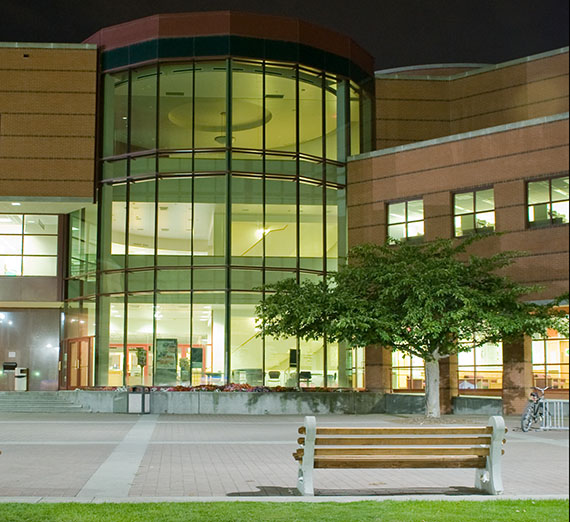Advancing A to Z in the Foley Library

Long past are the days when libraries sit as mere structures where students silently sequester themselves amongst the shelves to study in solemn spaces. Foley Library is a lively space where words whirl around in sound, on screens, in imagery and printed on paper or other products, both static and moving—where connections are made (human and technological), community is built, and curiosity is cultivated.
As expectations for creativity among faculty, staff, and students climb, Foley Library is answering the call. Beyond books, the Gonzaga community is finding resources, room, and research reinforcement to elevate and enrich the educational experience. True to Gonzaga’s historic form, Foley is focused on helping people learn how to think, not what to think.
“We help students develop the aptitudes and dispensations to think critically about information—consuming and creating it responsibly—and asking the question ‘what is quality information?’” explained Dean of the Foley Library Paul Bracke, Ph.D. “This sort of information literacy focuses on ethical information intake and redistribution, which are critical in our information-rich world.”
Foley Library continues to provide resources in its more traditional scope, only on a scale on par with the most outstanding libraries in the world thanks to its participation in a consortium that includes nearly every major university in Oregon and Washington.
“We went from having access to around 300,000 circulating items to 22 million,” said Bracke, whose vision for the Foley library is for it to function as a support for student success that dovetails with others doing adjacent work. Faculty librarians work collaboratively with faculty to integrate library services into their curriculum and assignments and as partners in research for faculty and students alike. Advances in technology and course delivery continue to open doors for Foley to step forward into the future.
“The library is beyond the evolutionary phase,” Bracke explained, emphasizing that Foley is ready for its revolutionary phase—a reimagining of the space to better suit its offerings in practice. Students are expected to be creative and professional in presenting their work, and may need to record a podcast episode, shoot and edit a video, or make a tangible manifestation of their work. Faculty and students are seeking ways of publishing their work that protects intellectual property rights but also increases accessibility within the academic sphere. These aims require specialized spaces, equipment and resources that Bracke says are critical for Foley to provide equal opportunities and access to.
“It’s an issue of access and information justice,” said Bracke. “Providing learning resources for all students is vital to their success, and we have a lot of opportunity to innovate in this area.”
One area in which Foley Library is seeking to innovate is in visioning for its future—Dean Paul Bracke is currently recruiting for an advisory board to help determine the needs of the library and University as a whole. The board will consist of three to five members.
Contact Marit Jacobs at jacobsm@gonzaga.edu or (509) 313-5988 if you are interested in joining this advisory board. And, if you’d like to make a difference for Gonzaga University and its students by supporting the Foley Library with a donation you can make a gift online or connect with Major Gift Officer Marit Jacobs.
